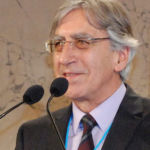Global Research Initiatives in Support of the 2030 Development Agenda and the Paris Agreement
This side event will present three major ongoing global research initiatives hosted at IIASA in collaboration with various institutions across the globe and focused on exploring pathways to achieve the Sustainable Development Goals (SDGs). These three research initiatives include: The World in 2050 (TWI2050), Integrated Solutions for Water, Energy and Land (ISWEL), and Climate and Development Links (CD Links).
TWI2050: The Sustainable Development Goals (SDGs), unanimously adopted by the United Nations in September 2015, provide an aspirational narrative for the desired future for human development with an actionable agenda. The aspiration is for a world free from hunger, injustice and absolute poverty, of universal education, health and employment with inclusive economic growth, based on transparency, dignity and equity, all achieved within the boundaries of the planet. The urgent question now is how to act on this aspirational agenda and to have a clear understanding of the full consequences and cost of inaction and the benefits of achieving SDGs in every major region of the world. The World in 2050 (TWI2050) is a fact-based initiative designed to help answer these questions. TWI2050 aims not only to contribute to this understanding but also develop science based transformational and equitable pathways to sustainable development that can provide much needed information and guidance for policymakers responsible for the implementation of the SDGs.
ISWEL: The Integrated Solutions for Water, Energy and Land project is a GEF-IIASA-UNIDO partnership that seeks to develop integrated approaches to identify evidence-based policy and investment strategies that can inform decision making across the water, energy, and land-use sectors. Specifically, ISWEL will explore the challenges and opportunities different regions of the world face to jointly meet water, land and energy SDGs under different development pathways and provide a portfolio of cost-effective solutions. This assessment will be carried out at the global level and include two regional case studies consisting of selected transboundary basins facing multiple development and environmental challenges: the Zambezi and the Indus basins.
CD Links: A central question for policy makers is how to bring climate action into the broader sustainable development agenda. New approaches are needed to identify viable solutions and pathways for the future that align global and national perspectives while also addressing multiple policy priorities simultaneously. To date, however, there have been relatively few scientific analyses that have systematically explored the interplay between climate action and development while simultaneously taking both global and national perspectives.
As a result of their broad coverage, this session will provide input relevant to the High Level Panels of Day 1: Panels I, II, III, and IV
docum: Session Summary, Simon Langan – “Integrated Solutions for Water, Energy and Land (ISWEL), Nebojsa Nakicenovic – “TWI2050: Transformation toward Sustainable Future”, Shonali Pachauri – “SDG 7 Interactions with other SDGs: A Focus on Target 7.1 on Energy Access”, Keywan Riahi – “Linking Climate and Development Policies – Leveraging International Networks and Knowledge Sharing”




